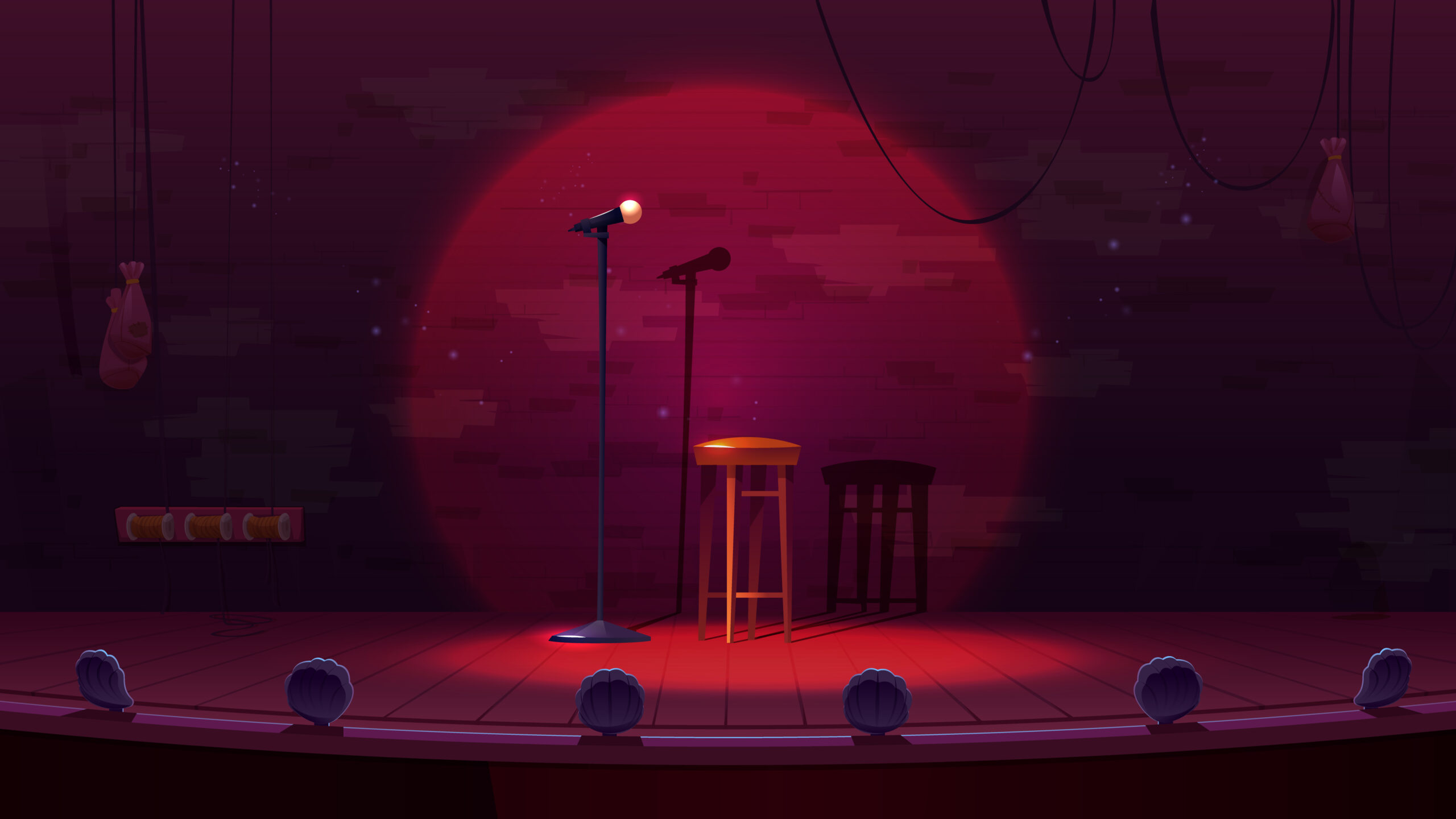Comedians have always faced a choice between political submission and true craft.
Court Jesters

Secular stand-up is domesticated opposition to the regime.
“‘They are ladies—look at their pronouns! What about this person isn’t a lady?’
‘Well, his penis.’
‘Her penis, you f***king bigot!’”
Ricky Gervais—SuperNature
Netflix’s latest comedy special is transphobic. Ricky Gervais has peppered his latest production with jabs at some higher-ranking members of the current intersectional caste system, thus shoring up his own reputation as a take-no-prisoners iconoclast. The special follows in the wake of a similar set by Dave Chapelle in “The Closer” (2021, also for Netflix), in which Chapelle compared trans genitals to plant-based meat substitutes.
At the same time as these comedians were attracting plaudits, money, and controversy, the Babylon Bee was suspended from Twitter for a story awarding “Man Of The Year” to the transgender assistant secretary of health, Rachel Levine. Peak “trans” seems to be low-hanging fruit for comedians and satirists, in large part because it represents such a flat denial of reality—always fertile ground for the absurd.
But do these popular comic gestures indicate that the tide is turning? Are woke speech codes failing to contain the irrepressible energy of American popular culture? Or is the regime trying to reabsorb its opposition?
Perhaps the money is just running out—maybe the woke party was always funded by reserve cash from saner times. Netflix has had a rough year, its stock price plummeting back to 2018 levels. Passing on a new comedy special from one of the highest-grossing stand-up stars on the planet may have been a decision they couldn’t afford to make. There is energy, momentum, and of course a lot of money in pointing out that the emperor is naked. In some instances, like when your organization is facing a financial abyss, it may be more expedient to tap into that energy.
But that doesn’t mean that either the staff or the culture is at a turning point—just that they’ve been forced into momentary retreat by a stock price collapse. Being financially strapped doesn’t mean having a change of heart or philosophy. And without the latter, nothing will permanently change. Once the woke recoup their losses with the likes of Gervais, they will use the money they make off of “dissidents” to go right back to punishing and silencing dissent.
But at a deeper, structural level, it’s in the regime’s interests to permit a few anointed jesters like Gervais and Chapelle to mock the excesses of trans activism. In large part, “trans rights” means a series of unconscionable demands: free rein for sex pests, gratuitous mutilation for people of all ages, and compelled speech codes. It will be easier to impose such an obviously perverse regime if those subjected to it are afforded the illusion of temporary release. It’s a kind of catharsis that serves to domesticate resistance: let the plebs have a little bit of levity, appoint them a court champion to “say the quiet part out loud,” then return to the inevitable march of progress. It makes the whole thing go smoother, with less real opposition.
Liberalism can absorb criticism of “trans” excesses by demanding a fundamental acceptance of the governing framework as payment for temporary license. And make no mistake, anyone who gets a Netflix gig fundamentally in the last analysis, commits to keeping his objections restrained within the carnival world of the stage, where rules are suspended and nothing is for keeps. “Trans rights are human rights!” Gervais reminds us at one point in his special, establishing that his jokes take place within a context of fealty to the regime—and so his protest is toothless. Pointing out the elephant in the room is a needed release valve for the pressures created by the permanent revolution. They might be grooming your kids, but on our ever-accelerating way toward the right side of history, at least we can crack some jokes about it.
Every one of the mainstream comedians who has dabbled in “transphobia” has gone out of their way to signal that they accept the fundamental framework laid out by trans activists. They make it clear that they believe in the sacred right to demand recognition as the gender of one’s choice. These comedians only quibble with the fanatics, or those who irritate them personally.
But there is no such thing as taking issue only with “extremists” in the “trans” revolution, and saying “live and let live” to everyone else. Asking to be left alone in light of a totalizing epistemic vision that requires your participation is not possible. It is the essence of transphobia, because you’re refusing to participate in the inescapable act that legitimates the trans person, namely, viewing and affirming him or her as he or she demands.
And so a legitimate question popped up in the show’s criticism from trans rights activists: If Gervais supports trans rights, which ones does he support? The “trans rights supporter” can’t exist without total surrender to the creed. “Trans” is a category that relies on the concession and support of the outside world for validation. Which parts of this game does Gervais think he can opt out of?
“Trans” is an appeal to join the faith, and outside of the faith, there are only infidels. “Don’t tread on me” is a useless norm in front of a new virulent religious paradigm, one of whose central tenets is that gendered souls are trapped in and tormented by ill-fitting bodies. If you don’t buy that story and don’t wish to validate it in others, there’s no way around your transphobia.
And so what is the difference between the transgressive musings of Gervais, newly signed to Netflix, and the satire of the Babylon Bee? The simple explanation is that one is liberal and the other is not. Even if the content of the criticism is similar, the liberal has no substantive arguments against trans activism outside of “don’t tread on me.” Like the trans activist, the liberal is accountable to the new gods, autonomy and progress: they will tread on you eventually.
By contrast, the Bee has other, even more unsavory commitments, like Christianity, representing a real threat, a competing value hierarchy that is not subject to revision. Simply put, in the eyes of the regime, Chapelle and Gervais are friends, the Bee is an enemy.
Gervais, as an avowed atheist and an obvious product of late-stage liberalism, is not actually fighting for a positive vision of the universe or man’s place in it. His show is called SuperNature because he wants to “debunk” all such totalizing claims of authority and commitments to metaphysical truth. Anything goes; nothing is sacred.
But this empty creed can’t stand up against the militancy of peak “trans”: it can only gesture vaguely toward “neutrality.” Gervais tried his hardest to bake in equal-opportunity desecration into SuperNature. The show has it all: beating up toddlers, baby funerals, dwarves, pedophilia, and the eternal specter of “the Christian right” playing the heel to the atheist progressive on the right side of history. He’s making fun of everybody, you see? How naughty is a lady penis joke if it’s sandwiched between a dead baby and the Holocaust?
It’s all in the spirit of free speech. It’s something to laugh about and then go home to enjoy the eternal slide down the slippery slope with everyone else. Gervais tries to appeal to “nature,” but the nature he invokes is a hollow parlor trick, a consumable edu-tainment tchotchke, something about which Bill Nye would theatrically simulate awe. It’s nature, as seen on Reddit. It’s also an insufficient standard to oppose trans activism. The high priests of nature—the biologists and other scientists—have converted to the “trans” creed as well. No facts can fight this ratchet, because the potential facts are filtered through the machine before they become facts. So, gender Gnosticism is official Science.
Inevitably, a centrist liberal like Gervais enters the conversation after more than 90% of the ground has been ceded to the progressive liberal. Ten years ago, this creed was still brewing in the catacombs of fringe academia and arcane forums. Now it is the religion of Exxon and Google. Their equivalent of the first and second council of Nicaea was held without your participation. Neither you nor Gervais was invited. You’re now allowed to quibble about the details: Double mastectomies at 14 or 16? Puberty blockers for 10-year-olds or younger?
The show makes clear that the things Gervais believes in are materialism, rationality, and Science, and that what he opposes is a transcendent worldview. Gervais is a proud atheist, and while that is a fair philosophical position to take, it is one that, on its terms and coupled with the well-trodden social libertarianism of the comedy set, is defenseless to turn back the liberal ratchet. Sadly, the thing he rails hardest against—a confident metaphysical ethic with its own countervailing moral claims on the human person—is the only thing that can resist our continual slide into gender lunacy.
Gervais now adds himself to the long list of liberals mugged by the current stage of the permanent revolution, longing for their own Goldilocks year and feeling rebellious for making “let’s go back to 2005” their political stance. Sorry Rick: this train only goes one way.
The American Mind presents a range of perspectives. Views are writers’ own and do not necessarily represent those of The Claremont Institute.
The American Mind is a publication of the Claremont Institute, a non-profit 501(c)(3) organization, dedicated to restoring the principles of the American Founding to their rightful, preeminent authority in our national life. Interested in supporting our work? Gifts to the Claremont Institute are tax-deductible.
How Comedy Can Save America.
The fight totalitarians can never win.
Even professional rule-breakers can’t slay this sacred cow.




